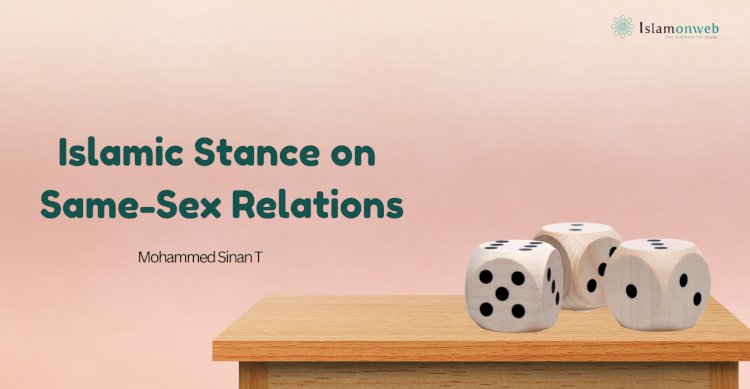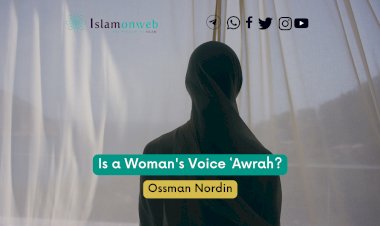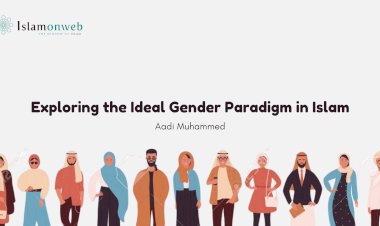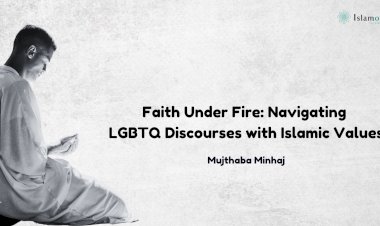Islamic Stance on Same-Sex Relations: A Refutation of Scott Kugle's Perspectives
One of the greatest gifts that God has bestowed upon humanity is the ability for sexual relations. This natural instinct enables individuals to procreate and preserve the family lineage[1] (Yuliastini et al., 2018; Ridwan & Wu, 2018), ensuring the continuity of human life. To safeguard the sanctity and legitimacy of sexual relations, all major religions have established laws pertaining to marriage.
The rise of social media has significantly amplified discussions surrounding lesbian, gay, bisexual, and transgender (LGBT) individuals within the Islamic world. Their increasing visibility has made the topic a focal point of contemporary discourse.
Currently, homosexual men and women are becoming more prominent in political discussions regarding sexual minorities. These individuals aim to carve out distinct spaces for themselves within nations, religious institutions, and broader society, seeking to normalise same-sex inclinations in public—a phenomenon referred to as homonormativity. However, they recognise that religious and cultural traditions pose significant obstacles to the construction of their identities. While secular and liberal postmodern societies often tolerate such inclinations, they view finding theological and ethical acceptance within religion as a more pragmatic approach than outright rejection of religious traditions.
In this context, religious revisionists and activists have attempted to reinterpret the Qur'an and Hadith to construct a theological basis for homosexuality. Since the turn of the century, there has been a noticeable effort to employ Islamic scriptures to legitimise homosexual identities.
This analysis seeks to highlight the methodological errors and internal inconsistencies in the arguments presented by these revisionists and activists. Specifically, it focuses on the sexual identities and claims for religious legitimacy of individuals identified as LGBTQIA+, challenging the perspectives of Scott Kugle, who has sought to validate LGBTQ+ ideologies within Islam despite the religion's clear opposition to such beliefs.
Perspectives in Islamic Jurisprudence:
The classical and modern books of fiqh do not contain the phrase "LGBT." In legal texts, these concepts are expressed by terms such as musāḥaqah or siḥāq for homosexual activity between women and al-liwāṭh for homosexual activity between men.
In discussions about lesbians or musāḥaqah/siḥāq, an expert on Islamic law from Egypt, ʿAbdul Qādir ʿAwdah, explains in his book Al-Tashrīʿ al-Jināʾī al-Islāmī Muqāranan bi al-Qānūn al-Waḍʿī 2[2]: "Lesbians (al-musāḥaqah) are women who engage in sexual acts with other women. All scholars agree that this act is ḥarām (prohibited) based on the word of Allah (SWT):
'And (the believers) are those who guard their private parts, except from their wives or those their right hands possess, for indeed, they will not be blamed. But whoever seeks beyond that, then those are the transgressors.'
(Sūrah al-Muʾminūn: 5–7)"
If a woman allows her private parts to be used by someone other than her husband—whether another woman or a man—she is among those who fail to guard their chastity and has transgressed.
In this matter, there is a ḥadīth narrated from the Prophet (PBUH), in which he said:
"A man should not look at the private parts of another man, and a woman should not look at the private parts of another woman. Men should not lie naked with other men under one blanket, and women should not lie naked with other women under one blanket."
(Narrated by Muslim, Ahmad, al-Tirmidhī, and Abū Dāwūd) [3]
Islam, as a civilised and comprehensive religion, pays full attention to issues deemed unnatural or contrary to its principles (Zaini, 2016) [4]. The phenomenon of homosexuality is addressed in the Qur'an, particularly concerning relationships between men (commonly referred to as gay). Such relationships have been noted as far back as the time of Prophet Lūṭ (AS).
The story of Prophet Lūṭ (AS) highlights a group of Sodomites who engaged in same-sex relationships. Gay acts are classified as vile deeds, where men approach other men to fulfil their desires instead of turning to women (Mafaza & Royyani, 2020).
Islam emphasises marriage as a bond between individuals of the opposite sex, performed within the framework of legal and moral guidelines. Marriage is not merely about satisfying biological desires but is a sacred bond aimed at achieving sakīnah (tranquillity) and producing righteous offspring (Zaini, 2016).
The Qur'an addresses the subject of homosexual behaviour in several verses, including Sūrah al-Aʿrāf (80), Sūrah al-Naml (54), Sūrah al-Shuʿarāʾ (165–166), and Sūrah Hūd (77–82). For example, in Sūrah al-Aʿrāf (80), Allah (SWT) states:
"And remember when Lūṭ said to his people: ‘Why do you commit such an immoral act that no one has ever done before you? Indeed, you approach men with lust instead of women. You are certainly transgressors.’"
In fact, "you are all people who have crossed the line" (Sūrah al-Aʿrāf: 80–81).
In al-Manār's interpretation, it is explained that Prophet Lūṭ (AS) was sent by Allah (SWT) to reform the creed and morals of his people, who lived in the lands of Sodom, Admah, Ṣabūʿīm, and Balaʾ, located along the shores of the Dead Sea. Prophet Lūṭ settled in the largest of the five cities, namely Sodom, which had experienced a significant moral decline. Men in Sodom preferred relationships with other men, abandoning relations with women (Rashīd Riḍā, 1950: 509; Zaini, 2016).
In Sūrah al-Naml, verse 54, Allah (SWT) states:
"And (remember the story of) Lūṭ, when he said to his people: ‘Why do you commit such an immoral act while you openly see it? Do you indeed approach men with lust instead of women? You are certainly an ignorant people.’"
This verse reminds the Prophet Muḥammad (PBUH) of the immoral behaviour of the people of Prophet Lūṭ. They are described as shameless and devoid of reason, committing acts of fāḥishah—immoral deeds considered abhorrent by logic and the customs of human society. Even animals act according to their natural instincts, with males seeking females and vice versa.
In Sūrah al-Shuʿarāʾ, verses 165–166, Allah (SWT) says:
"Do you indeed approach men among all people (165) and leave the wives that your Lord has created for you? Rather, you are a transgressing people (166)."
Some scholars also refer to a ḥadīth of the Prophet Muḥammad (PBUH), narrated by Abū Mūsā, in which the Messenger of Allah (PBUH) said:
"If a man engages in sexual relations with another man, both are guilty of adultery. If a woman engages in sexual relations with another woman, both are guilty of adultery."
(Narrated by Muslim)
Islamic jurists have different opinions regarding legal sanctions for homosexual acts. Some argue they fall under taʿzīr punishments, not ḥudūd punishments. This is because both lesbianism and homosexuality are classified as immoral acts, but they are not specifically prescribed ḥudūd penalties.
If the ḥadīth of the Prophet Muḥammad (PBUH), narrated by Abū Mūsā, which refers to homosexuality as adultery (zinā), is considered valid, it still does not place these acts under the category of zinā punishable by ḥudūd. This is because musāḥaqah and liwāṭh involve sexual acts without the insertion of genitals, whereas zinā that warrants ḥudūd punishment requires the physical act of intercourse involving penetration (“inserting the genitals”).
Modern Islamic legal expert Wahbah al-Zuḥaylī, in his book Al-Fiqh al-Islāmī wa Adillatuhu[5], provides further clarification:
- According to Imām Mālik, al-Shāfiʿī, and Aḥmad ibn Ḥanbal, the punishment for homosexual acts is a ḥadd They argue that since Allah (SWT) prescribes severe punishment for the people of Lūṭ in the Qur'an, the same severity should apply to homosexual acts. This includes treating homosexuality as a form of zinā, for which the punishment is stoning (rajm).
- On the other hand, Abū Ḥanīfah holds that the punishment for homosexual acts is taʿzīr, as homosexuality does not involve mixing of lineages (ikhtilāṭ al-ansāb), a primary concern in cases of zinā. Furthermore, he argues that homosexuality does not typically lead to the social disputes that warrant the application of ḥudūd.
- Among the Mālikiyyah and Ḥanābilah scholars, as well as the strongest opinion of Imām Aḥmad, the punishment for homosexual acts is stoning (rajm), regardless of whether the individuals involved are virgins (bikr) or previously married (thayyib). They cite a ḥadīth of the Prophet Muḥammad (PBUH):
"Whoever you find committing the act of the people of Lūṭ, kill both the one who does it and the one to whom it is done." [6]
Another ḥadīth mentions:
"Stone both the one who is ‘on top’ (fawq) and the one who is ‘below’ (taḥt)." (Armia, 2018)
The punishment for homosexual offenders, according to Shāfiʿīyah scholars, is equated with the punishment for adultery (zinā). If the offender is a muḥṣan (a person who is married or has been married), then the prescribed punishment is stoning (rajm). If the offender is not a muḥṣan, the punishment is flogging and exile, based on the ḥadīth of the Prophet Muḥammad (PBUH), narrated by Abū Mūsā al-Ashʿarī (RA):
"If a man engages in sexual relations with another man, then both are adulterers. If a woman engages in sexual relations with another woman, then both are adulterers." [7]
This ruling is derived from the principle that the punishment for homosexual acts falls under ḥudūd, as these acts involve sexual intercourse (waṭʾ). The penalty varies depending on the individual’s marital status, similar to the distinctions made for adultery, with the rationale (ʿillah) being that both involve forbidden sexual acts, whether in the vagina or with the genitals (farj), which are prohibited.
Contradictions in Arguments by Scott Kugle:
Scott Kugle is among the first Muslims to extensively publish on the issue of homosexuality and Islam. An independent research scholar in Islamic studies, he has previously held positions at Duke University, the University of Cape Town, and Swarthmore College. He has authored several books on homosexuality in Islam, the most notable being Homosexuality in Islam: Critical Reflection on Gay, Lesbian, and Transgender Muslims (Oxford: Oneworld Publications, 2010) and Living Out Islam: Voices of Gay, Lesbian, and Transgender Muslims (New York: New York University Press, 2013).
While many have sought to justify homosexuality through Islamic traditions, Scott Kugle has persistently pursued this goal. It is crucial to examine the flaws in his reasoning, especially when addressing initiatives to reinterpret Islamic teachings on homosexuality.
Scott Kugle’s first significant contribution on this topic appeared in the 2003 edited volume Progressive Muslims: On Justice, Gender, and Pluralism, published under the editorial direction of Omid Safi. In his article, Sexuality, Diversity, and Ethics in the Agenda of Progressive Muslims, Kugle highlights pluralism within Islam and advocates for sexual pluralism, which explicitly includes homosexuals.
In 2010, Kugle expanded on his ideas with the release of his comprehensive 500-page study, Homosexuality in Islam: Critical Reflection on Gay, Lesbian, and Transgender Muslims. This book presents a corrective argument that challenges the centuries-old wisdom tradition of Islamic jurisprudence. The content of this book examines the Qur'an, the ḥadīth, and narrations about the people of Prophet Lūṭ (AS). Additionally, it critiques the ḥadīth that condemns acts resembling those committed by the community of Prophet Lūṭ.
Argument Based on Hermeneutic Principles
Scott Kugle attempts to frame his pro-homosexuality argument by introducing ambiguous reinterpretations of Qur'anic hermeneutics. He asserts that the plurality within the Qur'an is a foundational concept, citing numerous verses to argue that the Qur'an embraces diversity and plurality. Based on this premise, he claims that sexual pluralism, including homosexuality, is embedded within the Qur'anic text. Additionally, Kugle controversially draws a parallel between polygamy and bisexuality in the Qur'an, using it as evidence to support his argument for sexual pluralism, although he fails to adequately substantiate this claim.
A fundamental rule of textual interpretation is to read a text in light of its internal references and context. Since the text and its context are inherently interrelated, any just reading of a text must consider both. However, Kugle's approach to the Qur'an departs from this principle. He isolates the text from its context, resulting in a reading that does not align with the broader framework of the Qur'an.
One example of Kugle’s interpretive revisionism lies in his treatment of the Qur'anic condemnation of the immoral acts (al-fāḥishah) of Prophet Lūṭ’s (AS) community. Kugle argues that the Qur'an condemns general immorality rather than the specific act of men sexually approaching men (tatūna rijāl). He suggests that al-fāḥishah in this context refers to the overall insolence of Prophet Lūṭ's people rather than their specific sexual misconduct.
However, this argument conflicts with the Qur'an's explicit language. In Sūrah al-Aʿrāf (80–81), immediately after mentioning al-fāḥishah, the Qur'an explicitly states:
"Indeed, you approach men with desire instead of women." (tatūna rijāl).
This clearly defines al-fāḥishah in the context of the actions of Prophet Lūṭ’s community. Kugle’s argument demands that al-fāḥishah be read in isolation from the phrase tatūna rijāl, thereby disregarding the textual and contextual coherence of the Qur'an.
Furthermore, Kugle dismisses the interpretations of jurists and Qur'anic commentators who, for over a thousand years, have consistently explained these verses as condemning homosexual acts. His so-called corrective reading attempts to separate the text from its context without providing a convincing rationale for this distinction. This approach undermines the integrity of established Qur'anic hermeneutics by creating an artificial divide between text and context.
Scott Kugle further claims that, just as the Qur'an does not explicitly discuss the concept of "sexual identity," it also does not expressly reference "homosexuality." Based on this premise, Kugle argues that it is permissible to interpret homosexuality in the Qur'an since it is not explicitly condemned. However, this reasoning overlooks a critical point: the Qur'an does not treat sexuality as a distinct identity marker. Instead, it frames all sexual activity—whether permissible or prohibited—within the broader concept of the shahwah (sexual desire), categorising them accordingly.
The Qur'an explicitly permits sexual relations within the confines of marriage or with slaves, commanding believers to guard their intimate areas (furūj) except with their spouses or those their right hands possess. It forbids all other forms of sexual activity as transgressive and immoral. Therefore, the Qur'anic framework clearly delineates acceptable sexual relations without needing to explicitly categorise acts such as homosexuality as distinct identities.
Kugle also asserts that the Qur'an does not use the terms "Lūṭī" (a reference to the people of Prophet Lūṭ) or "liwāṭh" (sodomy) and argues that this absence justifies a more permissive interpretation of homosexuality. However, this line of reasoning is flawed. As Mubeen Vaid points out, the Qur'an does not include specific legal categories such as Sunnah, ḥadīth, or fiqh, as these were analytical frameworks developed later by Islamic jurists to derive legal rulings from the Qur'anic text. Applying Kugle's logic consistently would undermine the validity of these well-established frameworks.
Another of Kugle’s justifications is that the Qur'an does not prescribe explicit punishments for homosexuality. He argues that this omission allows room for a more accommodating interpretation. However, the Qur'an similarly does not detail punishments for crimes like rape, bestiality, or other sexual offences. This omission does not imply permissibility; rather, it demonstrates that the Qur'an provides guiding principles, leaving jurists to determine specific legal rulings based on Sunnah and fiqh.
Moreover, Kugle’s approach reflects a significant methodological inconsistency. He attributes modern concepts of sexual identity and contemporary sexual interactions to the Qur'an without analysing them within the framework of Qur'anic principles of sexuality and morality. This approach disregards the Qur'anic worldview on sex, which is deeply rooted in the concept of maintaining modesty and restricting sexual relations to permissible boundaries.
Another argument presented in Scott Kugle's book Homosexuality in Islam is that Prophet Lūṭ (AS) did not specifically condemn the act of approaching men sexually when he criticised his people for coming to entertain his male guests, who were already married. According to Kugle, Prophet Lūṭ’s rebuke was not directed at homosexuality itself but at the violation of the directive to engage only with their wives. To support this claim, Kugle cites the verse from Sūrat al-Shuʿarāʾ:
"Do you forsake the mates your Lord has created for you?"
As Kugle argues, if the issue had been their wives, Prophet Lūṭ should have explicitly mentioned this in his command. Instead, Prophet Lūṭ offered a broader directive to "approach his daughters"—a phrase that, as most mufassirūn (exegetes) note, is interpreted to mean the women of his community, not his biological daughters.
Kugle’s writings, however, reveal contradictions in his homocentric hermeneutic approach to the Qur'an's narratives about the people of Lūṭ. For instance, in his article Sexuality: Diversity and Ethics, Kugle argues that Prophet Lūṭ offered his daughters to protect the honour of his male guests and prevent their rape. Kugle claims that Prophet Lūṭ’s primary concern was to forbid the humiliation of guests, concluding that the Qur'an does not categorically oppose homosexuality but rather the act of shaming others.
However, Kugle later revises this position in his book Homosexuality in Islam. He expresses discomfort with the notion that a prophet would offer his daughters to be raped. In this revision, he interprets Prophet Lūṭ’s words as a satirical comparison, suggesting that the Prophet was not seriously offering his daughters but rather making a rhetorical point.
In summary, Kugle's arguments rest on selective readings and a disregard for the Qur'an's holistic approach to morality and sexuality. His attempts to interpret homosexuality in the Qur'an fail to align with the text’s clear guidance on permissible and prohibited sexual conduct.
Ibn Ḥazm and Ibn Dāwūd
In his efforts to establish a homosexual identity within the Muslim tradition, Scott Kugle ventures beyond the authentic content of Islamic tradition. As part of this approach, he draws on Tawq al-Ḥamāmah fī al-Ulfah wa al-Ullāf by Ibn Ḥazm, a renowned Andalusian scholar and philosopher of the 10th century, and Al-Zahra by Muḥammad ibn Dāwūd al-Ẓāhirī, the son of Dāwūd al-Ẓāhirī, the founder of the Ẓāhirī school of thought. However, even in engaging with these texts, Kugle repeats critical methodological errors.
Ibn Ḥazm’s Tawq al-Ḥamāmah primarily focuses on the concept of love, including stories, poems, principles, and experiences related to love. Western readers have often misunderstood the same-sex content in this work, interpreting it as indicative of homosexual identity. Kugle capitalises on this misinterpretation in his revisionist book, Homosexuality in Islam. However, Kamila Adang, a professor of Islamic studies at Tel Aviv University and an expert on Ibn Ḥazm’s intellectual contributions, refutes such claims in her study Ibn Ḥazm on Homosexuality: A Case-Study of Ẓāhirī Legal Methodology. Adang clearly demonstrates that Ibn Ḥazm did not recognise homosexuality as a sexual identity in Islam.
Ibn Ḥazm argued that individuals engaged in pederasty should not receive the same ḥadd (prescribed punishment) as those involved in adultery. This reflects the literalist methodology of the Ẓāhirī school, focusing strictly on the text without extrapolation. Moreover, it is evident from Ibn Ḥazm’s writings that his commentaries on this issue did not specifically address homosexuality as a concept but were rather limited to literal textual interpretations.
In Al-Zahra, Ibn Dāwūd writes about his personal experiences of love and the infatuation he felt for a boy. Kugle identifies this as a cornerstone of his argument. However, a careful reading of the text reveals that Ibn Dāwūd viewed these feelings as desires and refrained from engaging in prohibited actions. The work does not focus exclusively on same-sex desires; instead, it emphasises the virtue of resisting and overcoming lustful inclinations.
Moreover, as Mubeen Vaid notes, Ibn Dāwūd’s resistance to his desires and his triumph over them is often celebrated in biographical accounts as one of his notable achievements. Al-Zahra itself testifies to this, recounting how, on his deathbed, Ibn Dāwūd remembered a saying attributed to the Prophet (PBUH) (though its authenticity is debated by many scholars):
"If a person falls in love, conceals it, maintains chastity, and dies in that state, they are considered a martyr."
This reflects Ibn Dāwūd’s commitment to moral restraint and the preservation of chastity, further contradicting Kugle’s attempts to frame him as a proponent of homosexual identity within the Islamic tradition.
Conclusion
This paper has explored contemporary efforts within the Islamic framework to legitimise homosexuality. The findings clearly demonstrate that the actions and activities of LGBT individuals are deemed ḥarām under Islamic law, which prescribes specific penalties for such acts. Based on this analysis, it can be confidently concluded that Scott Kugle's arguments fail to hold validity in this context.
Sheikh Hamza Yusuf, a prominent Islamic scholar in the West, also regards homosexuality as a fitnah (trial) akin to other challenges individuals may face. He advises those grappling with such inclinations to exercise patience and avoid situations that might provoke temptation, much like the case of male-female attraction. He emphasises that fixed principles in religion cannot be altered to suit contemporary trends. It remains an established truth in Islam that rectal intercourse—whether between two men or between a man and a woman—is unequivocally ḥarām and a great sin.
In conclusion, the Islamic jurisprudential approach decisively refutes Scott Kugle’s attempts to legitimise LGBT beliefs within Islam, affirming the religion’s steadfast rejection of such practices.
About the author :
Mohammed Sinan T, Student at Darul Hidaya Da’wa College, Manoor.
REFERENCES:
1, Ridwan, R., & Wu, J. (2018). ‘Being Young and LGBT, what Could be Worse?’Analysis of Youth LGBT Activism in Indonesia: Challenges and Ways Forward. Gender & Development, 26(1), 121-138.
2, Abdul Qadir 'Audah,in his book "Al-Tasyri' al-Jiana-iy al-Islamiy Muqoranan Bi al-Qanun al-Wadh'iy'',page no 367
3, Sahih Muslim 338a : Book 3, Hadith
4,5. Zaini, H. (2016). LGBT dalam Perspektif Hukum Islam. Jurnal Islam Syari'ah, 15(1), 65-73
6, Wahbah Al-Zuhailiy,book "Al-Fiqh Al-Islami Wa Adillatuhu," volume 9, page 5393 7. Sunan Ibn Majah 2561,Book 20, Hadith 29
7, Hadith riwayat al-Tabarani in al-Mu‘jam al-Awsat [no.hadith 4157] 9. Khaled El-Rouayheb, Before Homosexuality in the Arab-Islamic World, 1500–1800 (Chicago: The University of Chicago Press, 2005).
8, The Love of Boys in Arabic Poetry of the Early Ottoman Period, 1500 – 1800,” Middle Eastern Literatures 8, no. 1 (2005).
11, Mubeen Vaid, Can Islam Accommodate Homosexual Acts? Quranic Revisionism and the Case of Scott Kugle, (www.muslimmatters.org)
12, Ali pour, Essentialism and Islamic Theology of Homosexuality: A critical reflection on an Essentialist Epistemology toward Same-sex desires and Acts in Islam.
13, Ovamir Anjum , Islam and Homosexuality, American Journal of Islamic Social Sciences, https://thethinkingmuslim.com/2017/09/08/islam-and-homosexuality/
14. John D. DeLamater, Janet Shibley Hyde, Essentialism vs. Social Constructionism in the Study of Human Sexuality
Citations:
[1] Ridwan, R., & Wu, J. (2018). ‘Being Young and LGBT, what Could be Worse?’Analysis of Youth LGBT Activism in Indonesia: Challenges and Ways Forward. Gender & Development, 26(1), 121-138.
[2] Abdul Qadir 'Audah, "Al-Tasyri' al-Jiana-iy al-Islamiy Muqoranan Bi al-Qanun al-Wadh'iy', Volume 2, p. 367
[3] Sahih Muslim 338a : Book 3, Hadith 90
[4] Zaini, H. (2016). LGBT dalam Perspektif Hukum Islam. Jurnal Islam Syari'ah, 15(1), 65-73
[5] Wahbah Al-Zuhailiy,book "Al-Fiqh Al-Islami Wa Adillatuhu," volume 9, page 5393
[6] Sunan Ibn Majah 2561,Book 20, Hadith 29
[7] Hadith riwayat al-Tabarani in al-Mu‘jam al-Awsat [no.hadith 4157]
Disclaimer
The views expressed in this article are the author’s own and do not necessarily mirror Islamonweb’s editorial stance.
2 Comments
-

There is a great deal that I agree with in this article. However, I think the author has made a mistake by not interrogating the concepts of "homosexuality" or "lesbianism" critically. Khaled el-Rouayheb has argued both concepts are fundamentally Western in origin. Traditional fuquha unanimously agreed that liwat (anal sodomy) was a sin. However, they did not necessarily see courtship or other acts as forbidden. Hence, traditional Islamic cultures often accepted and praised same-sex courtship, love etc. but strictly forbade liwat. This is difficult for modern and Western audiences to understand because in Western culture love is connected with sex, whereas this is not the case in traditional Islamic societies. Muslims are right to oppose anal sodomy as a clear sin and they are right to be suspicious of the anti-religious spirit of LGBT culture. However, they go too far when they interpret this clear Quranic prohibition against sodomy with romantic infatuation, chaste courtship, loving relationships etc. which are not clearly forbidden.
-

























Leave A Comment